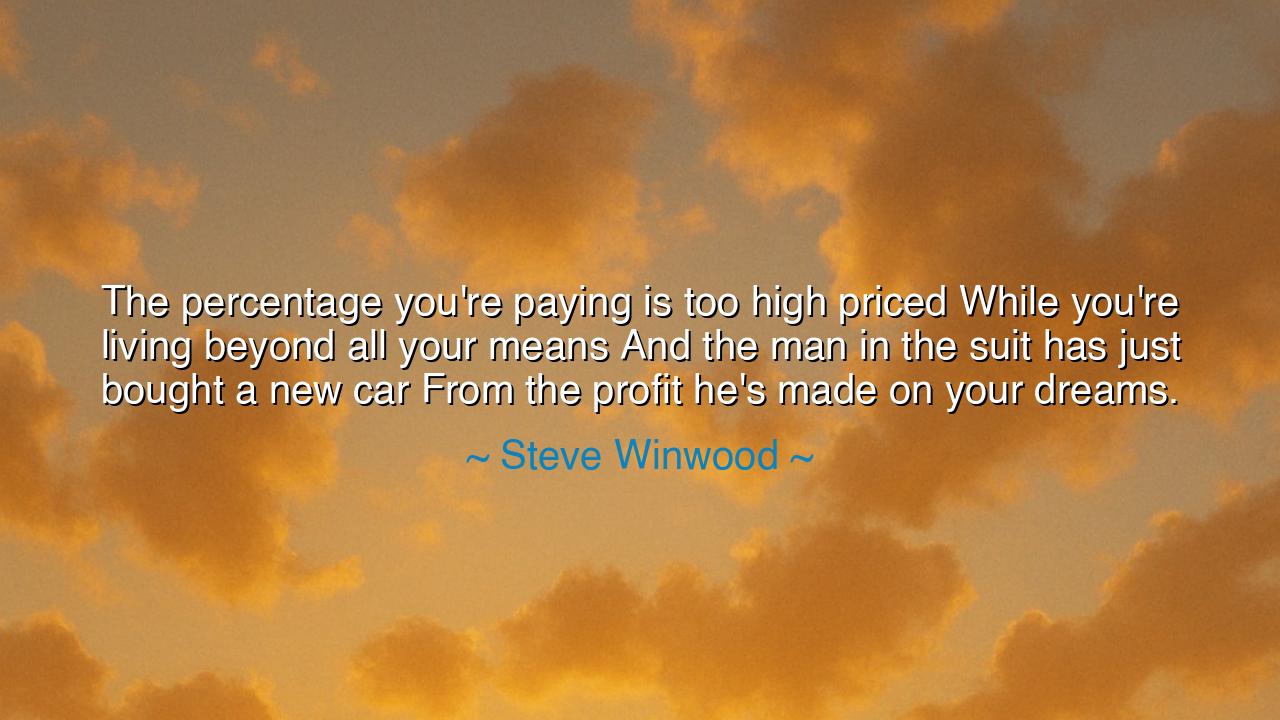
The percentage you're paying is too high priced While you're
The percentage you're paying is too high priced While you're living beyond all your means And the man in the suit has just bought a new car From the profit he's made on your dreams.






The words “The percentage you're paying is too high priced, while you're living beyond all your means, and the man in the suit has just bought a new car from the profit he's made on your dreams” were sung by Steve Winwood in his timeless song Back in the High Life Again. Yet though they come wrapped in melody, they carry the sharp edge of prophecy—a warning against exploitation, greed, and the spiritual emptiness of a life ruled by material illusion. Beneath their poetic rhythm lies a truth as old as civilization itself: that in every age, the powerful profit from the dreams of the hopeful, and the dreamers, lost in pursuit of comfort or status, too often forget the cost of their submission.
When Winwood speaks of “the percentage you're paying,” he speaks not only of money, but of life’s energy—the hours, the hope, the creative spark surrendered in exchange for the illusion of success. The “man in the suit” is more than a businessman; he is a symbol of the system that feeds upon human aspiration, transforming dreams into commodities, and selling them back at a price that enslaves the soul. Those who “live beyond all their means” are not only spenders of wealth, but borrowers of identity—people who have traded their authenticity for the appearance of success. Thus, the song becomes both lament and awakening: a reminder that when we measure worth by possessions, we become possessions ourselves.
This truth has echoed through the centuries. In ancient Rome, the poet Juvenal warned of the same corruption when he wrote of citizens who traded their freedom for “bread and circuses.” They forgot their dignity, content to be distracted by comfort while the emperors grew fat on their obedience. So too, in every era, the few have enriched themselves on the dreams of the many—by selling false promises, by chaining ambition to debt, and by convincing people that happiness is something to be bought. Winwood’s lyric, though born of the twentieth century, belongs to this eternal chorus of voices crying out for awareness in a world of deception.
Yet there is a deeper layer still. The “profit” made upon our dreams is not always monetary. Sometimes it is spiritual. When one’s vision is shaped by others—by advertisements, by trends, by the endless comparison of modern life—then one’s dreams no longer belong to oneself. They are stolen before they can take flight, and their power is used by those who understand desire better than those who feel it. The man in the suit thrives not because he is evil, but because he is clever enough to sell people their own illusions. The tragedy is not his greed—it is our forgetting of who we are.
Think of Vincent van Gogh, who painted not for wealth, but for truth. He lived in poverty, mocked and ignored, while merchants sold imitations of beauty for fortunes. Van Gogh’s reward was not gold, but freedom—the freedom to dream without a price tag. Though he died poor, his art endures as a testament to the incorruptible spirit of creation. He reminds us that the value of a dream lies not in how much it earns, but in how deeply it connects to the soul.
Winwood’s words, then, call us to wakefulness—to reclaim ownership of our dreams. They remind us that the world will always try to set a price on what is priceless. The “percentage” grows with every compromise, every borrowed desire, every time we measure ourselves by standards not our own. But the wise know that fulfillment cannot be bought, nor meaning manufactured. To live within one’s means is not merely to balance one’s purse, but to balance one’s heart—to spend only what aligns with truth, to give energy only to what nourishes the spirit.
Let this be the lesson, O listener of life: guard your dreams as sacred treasures. Do not sell them cheaply to those who promise quick rewards. Work with integrity, live with humility, and measure success not by what you possess, but by what you create and who you become. Let your ambition serve your soul, not your vanity. And when you are tempted to envy the “man in the suit,” remember this: the richest man may own the world and yet starve for peace, while the dreamer who walks in honesty possesses the only wealth that endures.
For in the end, as Steve Winwood’s lyric reminds us, the greatest profit is not in money but in meaning. The true high life is not bought with gold, but earned through awakening—when you no longer live beyond your means, but within your truth; when no one profits from your dreams, because your dreams belong wholly to you.






AAdministratorAdministrator
Welcome, honored guests. Please leave a comment, we will respond soon